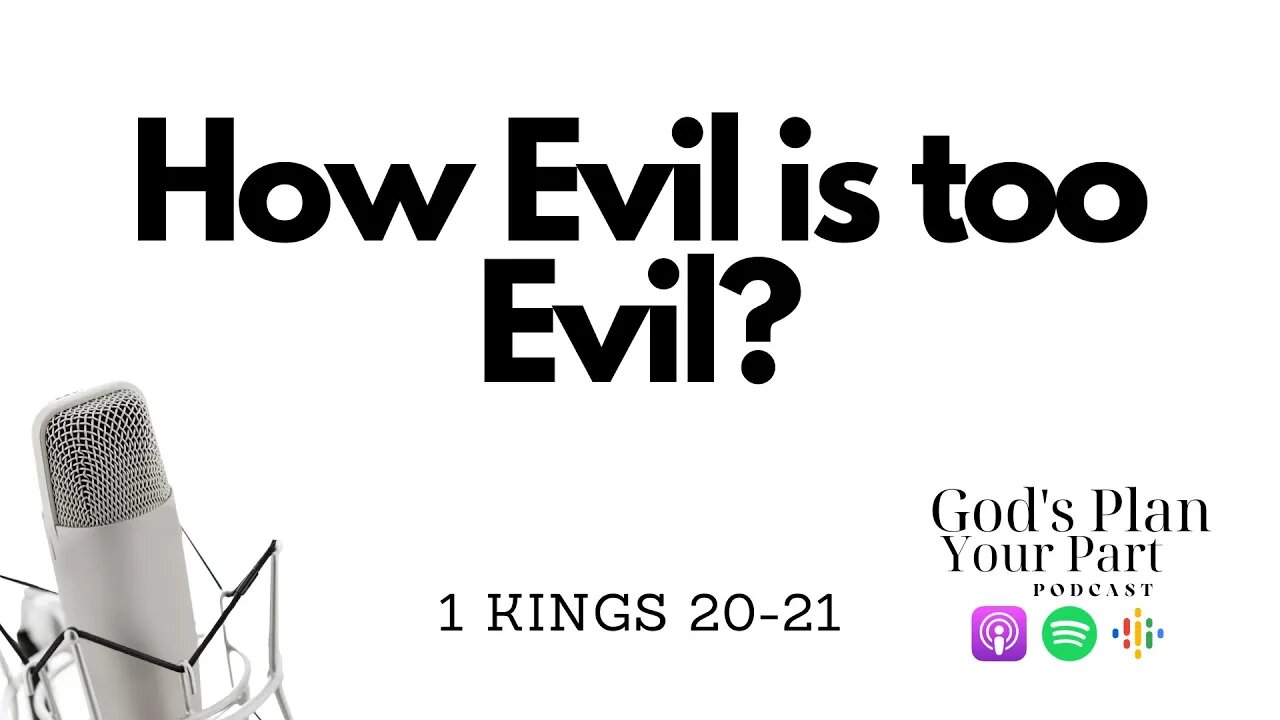Premium Only Content

1 Kings 20-21 | Is Ahab Evil?
Chapter 20 of 1 Kings portrays a battle between King Ahab of Israel and King Ben-Hadad of Aram. Through the prophet Elijah, God assures Ahab of victory and delivers a message that He will prove His sovereignty and protect His people. Despite being outnumbered, Israel defeats Aram in two successive battles. This victory serves as a divine judgment against idolatry and an affirmation of God's power and prophecy.
In Chapter 21, the focus shifts to a personal conflict involving Ahab and his wife Jezebel. Ahab desires to acquire Naboth's vineyard, but Naboth refuses to sell it, as it is his ancestral inheritance. Jezebel orchestrates a plot and falsely accuses Naboth of blasphemy, leading to his unjust execution. God sends Elijah to confront Ahab, delivering a powerful message of condemnation and divine retribution. Ahab humbles himself, resulting in a partial reprieve of God's judgment, but the consequences of his sin remain.
These chapters highlight themes of corruption, injustice, coveting, and the consequences of wickedness. They also emphasize the role of prophets like Elijah in challenging and rebuking those in power. Additionally, they illustrate the importance of humility, repentance, and seeking God's forgiveness. The story serves as a warning against idolatry, rebellion, and the abuse of power, while conveying the enduring lesson that God's justice and righteousness prevail over human wickedness.
In the narrative of 1 Kings 20-21, Ahab's character undergoes a significant transformation through his encounter with the prophet Elijah and God's judgment upon him. Despite his previous acts of wickedness and his role in promoting idolatry in Israel, Ahab demonstrates a moment of genuine repentance when confronted by Elijah. He humbles himself before God, tearing his clothes and wearing sackcloth, displaying a sincere desire to seek forgiveness and turn away from his sinful ways.
This display of humility and repentance shows that Ahab is not beyond the reach of God's grace. It serves as a reminder that God's mercy and forgiveness are available to all who sincerely seek them, regardless of their past actions or the depths of their wickedness. Ahab's repentance highlights the transformative power of genuine remorse and the willingness to acknowledge one's sins.
While Ahab's repentance does result in a temporary delay of God's judgment, the consequences of his previous actions still stand. This serves as a reminder that even though we may experience God's grace and forgiveness, there are often earthly consequences that we must face as a result of our choices. Ahab's story presents a complex picture of a flawed individual who, despite his evil deeds, has the capacity for genuine repentance and the opportunity to receive God's mercy and grace.
-
 17:40
17:40
Gods Plan Your Part
1 year ago1 Timothy 4 | Youth, Leadership, and Godliness
36 -
 1:28:14
1:28:14
On Call with Dr. Mary Talley Bowden
4 hours agoI came for my wife.
15.3K16 -
 1:06:36
1:06:36
Wendy Bell Radio
10 hours agoPet Talk With The Pet Doc
51.9K28 -
 30:58
30:58
SouthernbelleReacts
2 days ago $7.50 earnedWe Didn’t Expect That Ending… ‘Welcome to Derry’ S1 E1 Reaction
31.8K9 -
 13:51
13:51
True Crime | Unsolved Cases | Mysterious Stories
5 days ago $17.84 earned7 Real Life Heroes Caught on Camera (Remastered Audio)
48.9K11 -
 LIVE
LIVE
Total Horse Channel
16 hours ago2025 IRCHA Derby & Horse Show - November 1st
126 watching -
 4:19
4:19
PistonPop-TV
6 days ago $7.81 earnedThe 4E-FTE: Toyota’s Smallest Turbo Monster
41.5K -
 43:07
43:07
WanderingWithWine
6 days ago $4.78 earned5 Dreamy Italian Houses You Can Own Now! Homes for Sale in Italy
30.6K9 -
 LIVE
LIVE
Spartan
1 day agoFirst playthrough of First Berserker Khazan
116 watching -
 28:01
28:01
Living Your Wellness Life
2 days agoTrain Your Hormones
24.6K1